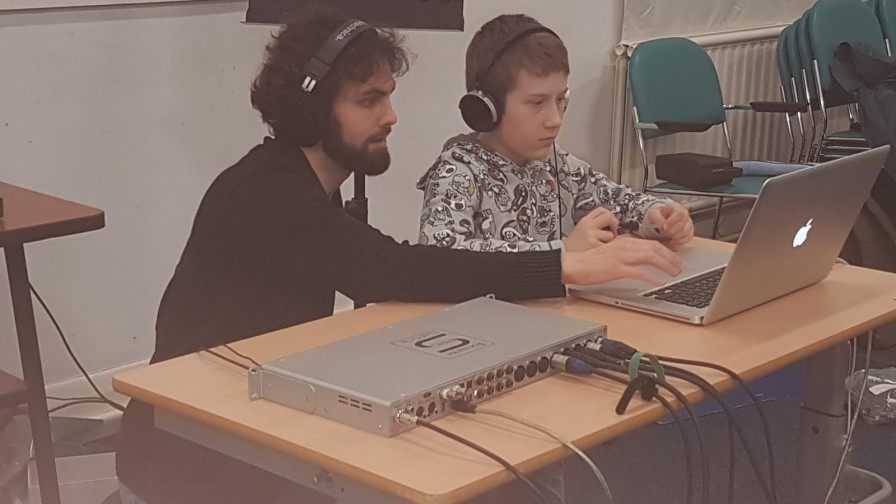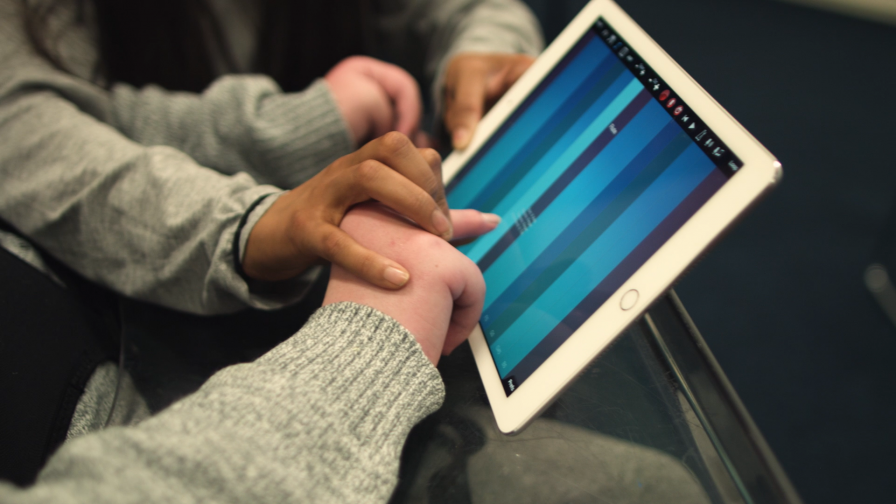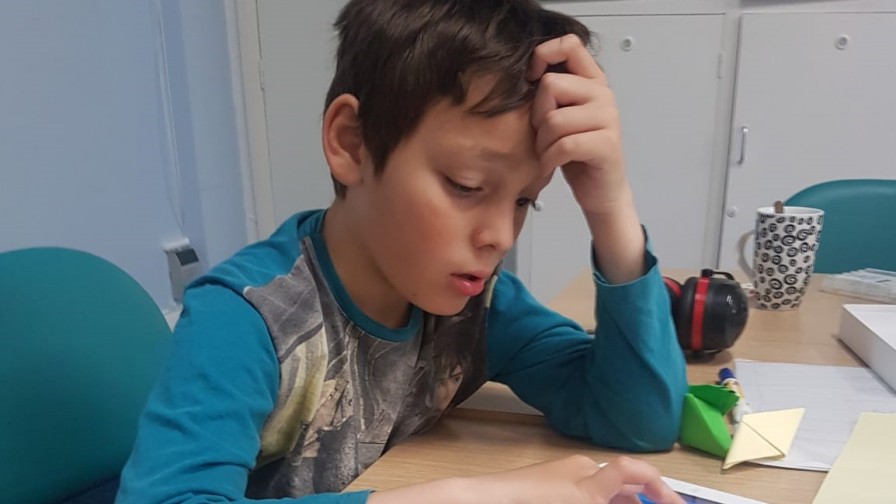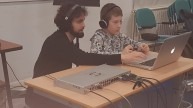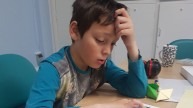Inclusivity & Music
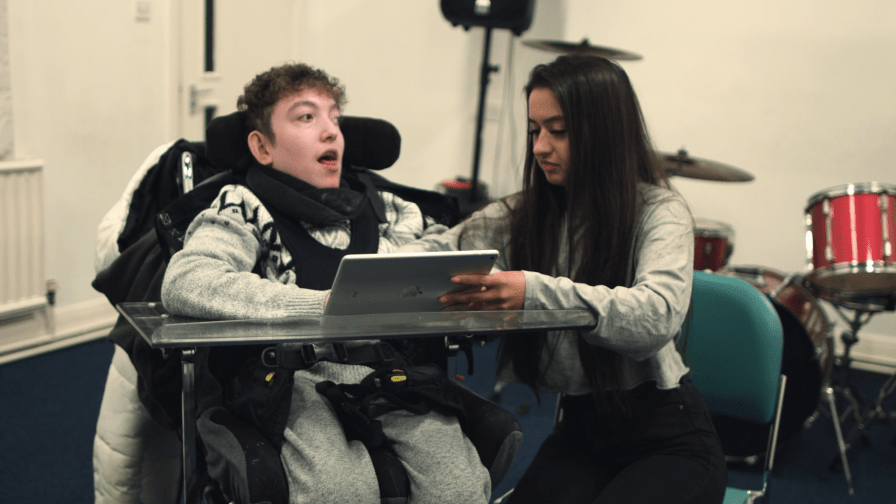
I currently work as an assistant music group leader in a youth music funded group called Sloop Group which is part of a Charity called Castaway-Goole. Castaway is a music theatre company based in Goole, East Yorkshire and offers arts opportunities to adults and children with learning difficulties, autistic spectrum conditions and mental health issues.
Sloop group is for young people aged 10 to 25 and caters for all abilities. With so many different needs and young people working at varying levels of musical ability, Inclusivity is key in how the group runs. Below are three different areas which have presented challenges that we come across in running the group and how we work to make the groups sessions inclusive and accessible for every young person:
Language
A number of the young people who attend the group speak English as a second language. One of these young people’s English isn’t as strong as the others and he often struggles to be part of the group. Some of the most touching moments in the group have been when I have asked one of the other children to repeat what I’ve said but in Portuguese so that he understands. However, even when it is explained in Portuguese he doesn’t always want to do the activity and becomes very easily distracted, often changing what instrument he plays every 5 minutes or choosing to play the iPad as an instrument then using it to watch YouTube videos. I’ve been told by the children he goes to school with, that he’s often excluded from school and he himself says he hates school and would rather be sat at home playing games all day. This information only strengthens the reasons why Sloop Group is a good place for him to come and although his behaviours can often distract other members of the group, it's amazing when he manages to join in and make music as part of the group.
Myself and the other music leaders and staff try very hard to encourage him to stay focused on an activity and stay with the group but this is often very difficult. One example of this sticks out in my mind above all other, it was when the group were recording a piece they had written together and had been rehearsing for several weeks, the young boy had done something different every week but never managed to stay focused long enough to know how to play the piece on any of the instruments he had played except the basic rhythm part. We gave him the choice of a Djembe drum or a Cajon for the recording. He didn’t want to do either but had a Djembe for the start of the recording, just as we were ready to record our first take he asked if he could play the drum kit instead (the young person who usually play the drums wasn’t there that week) to which I told him he couldn’t and explained the reason why was because he had never played drums for the song and didn’t know it well enough to play on the recording. As we had hit record and everyone had started playing he stood up and sat behind the drum kit, I quickly looked at him and shook my head (I didn’t want to make a sound on the recording) but he just looked back at me, picked up a pair of drum sticks and proceeded to play the intro perfectly on the drums. I couldn’t stop myself from smiling and just gave him a thumbs up and he carried on and played the drum part exactly how it should be played until the end of the song. By the time we had finished recording I told him how amazing he was to have learnt that whilst listening in the previous sessions and without ever playing it before with my eyes beginning to water pretty bad by this point. This experience for me massively reinforced what I had already known about persistence and giving young people the chance to settle into a group no matter how long that takes.
ASD (Autistic Spectrum Disorder)
Numerous young people with autistic spectrum conditions are part of Sloop group, some of whom can find it hard to interact with staff and other members of the group and in one case struggles to remain in the room for very long. There is a quote I love about autism from Dr. Stephen Shore “If you’ve met one person with Autism, then you’ve met one person with Autism” which, to me, perfectly sums up that even though there are common traits of autism such as; differences in communication, social interaction, sensory receptivity, and highly focused interests, each person is uniquely different from the rest and so there isn’t one way or method of working with people with Autism.
The individual I’m focusing on in this section is a young person who has become a close family friend since joining sloop group and so I now interact with him outside of Sloop Group on a fairly regular basis but in a completely different manner to when I’m a Music Leader at Sloop. I know he’s been playing Guitar for almost a year now at school but he won’t play it at sloop or if I’m visiting his house and clearly sees it as something he does in a school setting.
It took some time for this young person to sit in a circle of chairs with the rest of the group (which is how we start nearly every session) as at first he just watched the group from the edge of the room or even from behind a slightly ajar door. When he did begin to integrate with the group activities he was extremely quick at picking up a new instrument and learning different aspects of music. One of the first things he did with the group was to compose a melody using a set scale on a Marimba. When he first played this riff to me it felt completely random, swapping sporadically from one end of the marimba to the next. After he had finished showing me, I told him that I liked it and asked if he could play it again, which to my complete amazement he did the exact same as he had just done. He is a very clever young man and usually is able to do something on his first attempt, which has become an issue when he is not able to do this (usually down to a physical barrier such as the size or weight of an instrument , the instrument not staying in tune or being able to hold a bow the correct way) which has caused him distress. The other side of this occurs when we have managed to get him playing in with the rest of the group for a rehearsal and he is able to play the piece perfect the first time and then struggles to understand why he should play it again as he made no mistakes and therefore playing it a second time wouldn’t make him any better at it (he understands others have made mistakes and need to keep rehearsing but at this stage he wants to leave the room and do something by himself) The other challenge for him that occurs is when the group are deciding something together with a vote, something such as the title or structure/arrangement of a song, in which he has a very strong and definite idea of what he wants it to be and is frustrated if it ends up being something different.
He has a strong interest in computers and technology and the sessions he has been most actively involved in have been ones where we have recorded the groups composition where he has taken up the role of sound engineer on the laptop and learnt how to use the software (very quickly) and follow instruction very effectively. Recently, Sloop Group have purchased a USB MIDI keyboard and audio software (Ableton Live) for a desktop computer in a room next door to the main space we primarily use, for some projects we have let this individual do the group activity or something very similar but working by himself which has proved very effective for him. It is explained and agreed upon at the start of the session that we’d like him to join in with the group at the start, work by himself and then join the group again for example which works well for him the majority of the time. The last concert the group performed at, he performed the piece the group had wrote and rehearsed together and then his own piece was played at the end, which he was very happy with.
PMLD (Profound and Multiple Learning Disability)
One young person, who attends the group with a one to one support, has more profound needs than the rest of the group; he has extremely restricted movement (confined to a wheelchair) and is completely non-verbal. The only voluntary movement I have noticed is when I placed headphones on his head and he shook his head from side to side until they fell off or I removed them. He tends to laugh or make a lot of vocal sounds when enjoying something. He definitely enjoys people singing in a group around him and often responds loudly and with a lot of smiling when the group do vocal warm ups in a circle around him.
He mainly uses an iPad with the app 'Thumb Jam' which is an app with over 40 high quality real instruments sampled exclusively for the app with over 100 scales. The app sets out notes to be triggered by touch on the screen with however many notes the user decides. He has also used various percussion, which he often responds to the sound of in a positive way, with his carer playing it by guiding his motion to control the sound. The way he 'plays' this is with his carer taking his hand (due to him having no control of his own movement) and moving it across the iPad screen triggering the sounds. A speaker is always placed close to him to strengthen his connection to it being his movement that is making the sound. He has attended a lot of different concerts with the group over the last few years and this seems to be something he really enjoys as he always seems to laugh and make a lot of vocal sounds when on stage in front of an audience as well as enjoying the stage lighting.
Only a portion of the members of the group interact with him, which I think is mainly down to some of the young people being unsure how to do so as he is non-verbal and they will occasionally talk to his carer instead. Myself and other members of staff always talk to him directly and we find this does eventually seem to transfer into how other members of the group talk and interact with him.
A large part of what he gets from being part of the group is a sensory enjoyment of the sound. When speaking with his mother, she told me she feels the group means a lot to her son and feels he has friends there. When speaking to his carer (who remains the same person all the time) she also feels Sloop Group is good for him to attend for both social and musical enjoyment reasons.
Links:

